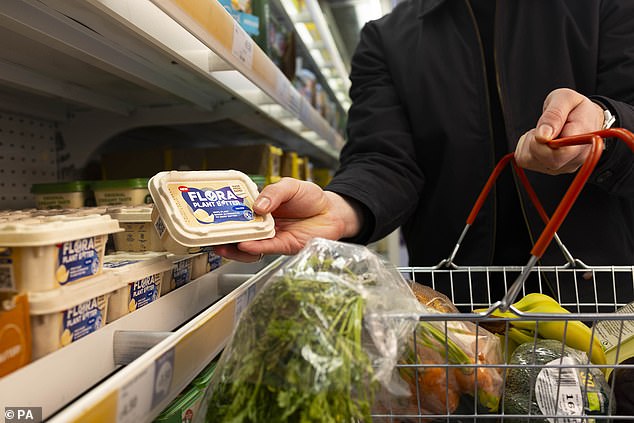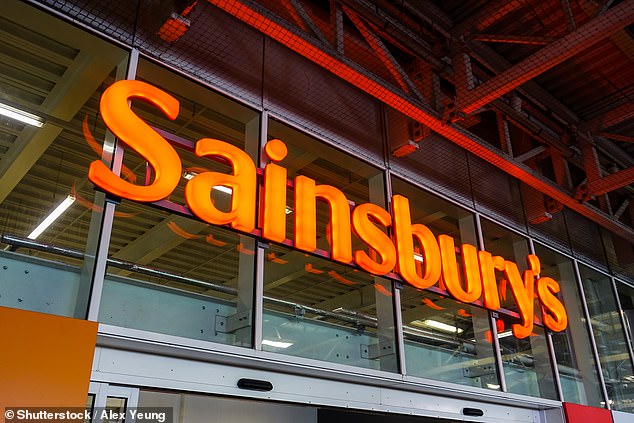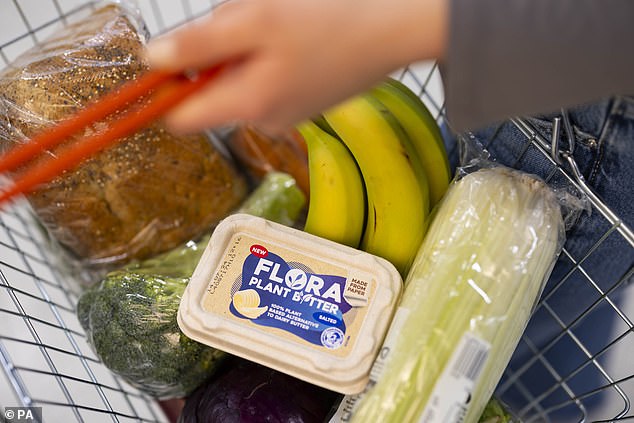The “world’s first paper margarine packaging”, launched by Flora earlier this year, is now available in the UK.
The plastic-free packaging will be available in 386 Sainsbury’s stores across the UK from April 17.
The new containers are made from compressed wet paper fibers and are completely oil and water resistant.
No plastic liner is included, which also means that the entire container can be recycled as household waste paper and cardboard.
The move comes as food company Upfield, which owns the Flora brand, aims to “reduce plastic across its portfolio by 80 per cent by 2030”.
The “world’s first paper margarine packaging”, launched by Flora earlier this year, is now available in the UK
The packaging has already been successfully rolled out in Australia and follows “four years of dedicated innovation by Upfield’s leading food scientists and product and packaging experts, in collaboration with Footprint, MCC and Pagès Group”.
It will initially be available for the brand’s Flora Plant B+tter Spreadable product, which launched last year and claims to be made with natural ingredients, as well as being 100% plant-based, dairy-free and palm oil-free.
“We know UK shoppers want products that have less climate impact, but they’re not sure how to easily do this,” said Ian Hepburn, UK marketing director at Upfield.
‘We launched Flora Plant last year and have now gone a step further by bringing world-first packaging innovation to UK supermarket shelves, helping shoppers make simple, sustainable switches.
“Flora has been a staple of British kitchen cabinets for over six decades thanks to our commitment to constantly listening to our customers and evolving our products in tune with their demands.”
It comes amid a big push for stores across the UK to reduce plastic in their packaging.
In December, it was reported that supermarkets were facing a ban on using plastic packaging for some fruit and vegetables under new rules that would force them to sell more fresh produce in bulk.
The Government is considering introducing new guidelines in a victory for The Mail on Sunday’s campaigns to combat the growing amount of food and packaging waste in the UK.

The new containers are made from compressed wet paper fibers and are completely oil and water resistant.

The plastic-free packaging will be available in 386 Sainsbury’s stores across the UK from April 17. Stock image used
In a return to traditional grocery methods, shoppers will have to choose exactly how many fruits or vegetables they want rather than buying larger pre-packaged quantities.
It will reduce the amount of food thrown away by encouraging people not to buy more than they need.
But it is also expected to lead to a huge reduction in the thousands of tonnes of plastic packaging that ends up in landfill or burned in the UK each year.
Research shows that each person in the UK throws away 76kg of food a year, an increase of 9kg on 2018.
The fight against plastic packaging has been recommended by anti-waste charity Wrap, which advises the Government, although it is believed that some delicate items, such as soft fruits, will be exempt.
While many supermarkets already sell fresh produce in recyclable or compostable bags, the new rules will make this mandatory.
Environment Minister Robbie Moore said: “No-one wants good food to go to waste. It damages our environment, is bad for business and is morally indefensible.”
Conservative MP Sir Robert Goodwill, chair of the Environment, Food and Rural Affairs Committee, said: “I welcome any attempt to reduce plastic packaging of supermarket food and allow more people to buy fruit and vegetables in bulk. “.
Sir Robert, a North Yorkshire farmer, added: “Of course, some foods such as cucumbers will always sell better packaged to lengthen the shelf life of the product and prevent leaks contaminating other foods.”
“But that packaging doesn’t always have to be plastic and, wherever possible, wholesalers and supermarkets should do everything they can to use recyclable paper-based packaging.”
Catherine David, head of behavior change and business programs at Wrap, said: “We waste 12 per cent of the food we buy, and the average household of four wastes £1,000 of good food every year.
‘This happens because our food system makes it difficult for people to buy only what they need and use more of what they buy.
But a spokesperson for the British Retail Consortium warned that any rules should not go too far, saying: ‘There are economic and technical barriers to increasing bulk goods (such as imported goods), which would not be resolved by introducing legislation.
“With supermarkets already facing very significant cost increases across the supply chain, it is important that any additional regulatory burden is proportionate and forms part of a cohesive strategy.”

